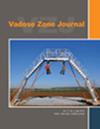渗透带水文学中的机器学习:闪回
IF 2.5
3区 地球科学
Q3 ENVIRONMENTAL SCIENCES
引用次数: 5
摘要
人工智能(AI)和机器学习(ML)最近在渗流带水文的各个学科中得到了广泛应用。然而,人们对其依赖于数据库的准确性和不确定性、再现性和交付性没有给予太多关注,这破坏了其在现实世界问题中的应用。我们讨论了过去的经验教训,并强调了基本协议的必要性和缺乏性(即,对数据处理的详细说明、ML模型的可访问性以及复制结果的清晰路径)。本文章由计算机程序翻译,如有差异,请以英文原文为准。
Machine learning in vadose zone hydrology: A flashback
Artificial intelligence (AI) and machine learning (ML) have been recently applied extensively in various disciplines of vadose zone hydrology. However, not much attention has been paid to their database‐dependent accuracy and uncertainty, reproducibility, and delivery, which undermines their applications to real‐world problems. We discuss lessons from the past and emphasize the need for and lack of fundamental protocols (i.e., detailed clarification on data processing, ML models accessibility, and a clear path for reproducing results).
求助全文
通过发布文献求助,成功后即可免费获取论文全文。
去求助
来源期刊

Vadose Zone Journal
环境科学-环境科学
CiteScore
5.60
自引率
7.10%
发文量
61
审稿时长
3.8 months
期刊介绍:
Vadose Zone Journal is a unique publication outlet for interdisciplinary research and assessment of the vadose zone, the portion of the Critical Zone that comprises the Earth’s critical living surface down to groundwater. It is a peer-reviewed, international journal publishing reviews, original research, and special sections across a wide range of disciplines. Vadose Zone Journal reports fundamental and applied research from disciplinary and multidisciplinary investigations, including assessment and policy analyses, of the mostly unsaturated zone between the soil surface and the groundwater table. The goal is to disseminate information to facilitate science-based decision-making and sustainable management of the vadose zone. Examples of topic areas suitable for VZJ are variably saturated fluid flow, heat and solute transport in granular and fractured media, flow processes in the capillary fringe at or near the water table, water table management, regional and global climate change impacts on the vadose zone, carbon sequestration, design and performance of waste disposal facilities, long-term stewardship of contaminated sites in the vadose zone, biogeochemical transformation processes, microbial processes in shallow and deep formations, bioremediation, and the fate and transport of radionuclides, inorganic and organic chemicals, colloids, viruses, and microorganisms. Articles in VZJ also address yet-to-be-resolved issues, such as how to quantify heterogeneity of subsurface processes and properties, and how to couple physical, chemical, and biological processes across a range of spatial scales from the molecular to the global.
 求助内容:
求助内容: 应助结果提醒方式:
应助结果提醒方式:


